India post-IPAB Should other courts also have their own IP division?
31 July 2023

New IP divisions at India’s High Courts have resulted in more efficiency. Should other courts also have their own IP division?
In 2021, the Intellectual Property Appellate Board (IPAB) in India was abolished. The IPAB was a quasi-judicial body tasked to handle IP rights disputes. Since then, two Indian High Courts have established their own IP divisions. The Delhi High Court was the first to do it; the Madras High Court followed suit.
Should more High Courts in India adopt the specialized IP court system like the Delhi and Madras High Courts did?
IP lawyers and attorneys interviewed by Asia IP believe so.
But first, let’s take a deep dive into the abolition of the IPAB and the formation of the Delhi High Court’s IP Division.
IPAB, IP divisions and IP litigation
On April 4, 2021, the Central Government of India promulgated The Tribunals Reforms (Rationalization And Conditions Of Service) ordinance. Among its objectives were to provide a mechanism for filing appeals directly to the High Courts and dissolve tribunals found to be unnecessary.
Among those that were dissolved was the IPAB, which had been beset with problems including administrative issues, lack of resources and delays. All pending cases before the IPAB were then transferred to India’s High Courts. “Initially, this move was seen with some apprehension as the High Courts in India were already overburdened and understaffed,” shared Charul Yadav, a partner at Obhan & Associates in New Delhi.
On February 24, 2022, the High Court of Delhi notified the Intellectual Property Division Rules, 2022 (DHC-IPD Rules, 2022) and the Rules Governing Patent Suits, 2022 (patent rules). The DHC-IPD Rules, 2022 streamline the process for resolving IP disputes in India, make the proceedings uniform and contain detailed procedures, among others. The patent rules simplify and strengthen the procedures for adjudication of patent infringement cases to make them more effective.
Thus, the IP Division (IPD) was established in the High Court of Delhi. Since its inception, the IPD has brought refreshing changes through its IPD rules. Among these changes were the consolidation of related matters, appointment of independent experts for assistance in matters, encouragement to use a dispute resolution mechanism through mediation proceedings, evidence recorded through video conferencing, specific categorization of cases pertaining to the Information Technology Act as IP cases, and others.
Previously, about 2,000 IP-related cases were transferred from the IPAB to the High Court of Delhi following the former’s abolition. With the presence of the dedicated IP unit, more than 600 cases received from IPAB have been disposed of by the Delhi High Court. The creation of its IP division also resulted in the following: institution of more than 1,000 cases within its first year, disposal of 50 percent of all patent appeals from IPAB, disposal of over 600 commercial suits within one year and disposal of 50 percent of trademark appeals filed in the IPD.
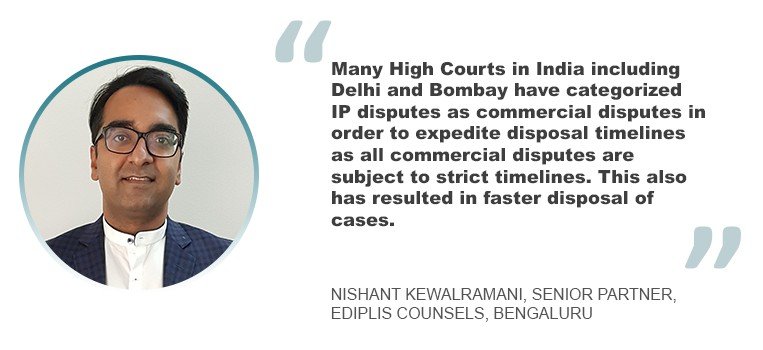
“Many High Courts in India including Delhi and Bombay have categorized IP disputes as commercial disputes in order to expedite disposal timelines as all commercial disputes are subject to strict timelines,” noted Nishant Kewalramani, senior partner at Ediplis Counsels in Bengaluru. “This also has resulted in faster disposal of cases.”
This was further bolstered by the DHC-IPD Rules, 2022 and the patent rules. According to Pravin Anand, managing partner at Anand and Anand in Noida, these rules have tackled administrative difficulties and lack of resources – issues that beset the IPAB.
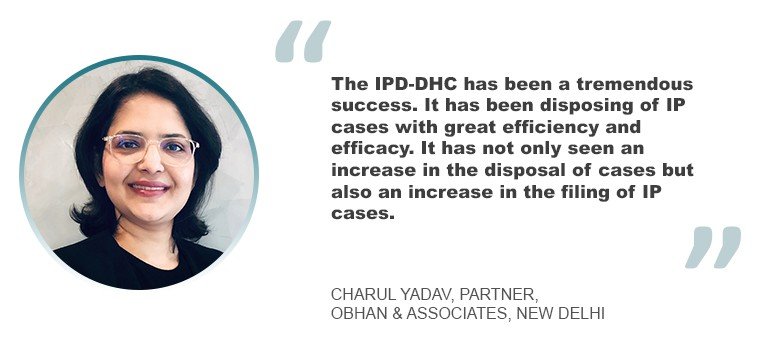
“The IPD-DHC has been a tremendous success. It has been disposing of IP cases with great efficiency and efficacy. It has not only seen an increase in the disposal of cases but also an increase in the filing of IP cases,” said Yadav, “thus indicating the robustness of the IP litigation framework.”
“The Delhi High Court, being the first High Court, has demonstrated proactive foresight by establishing a dedicated IP division exclusively for handling IP matters. This strategic move has proven effective in systematically managing cases transitioning from the IPAB. The Delhi High Court’s reputation as an IP litigation centre adds weight to its proactive approach,” said Kangan Roda, founding partner at illuminIP in New Delhi.
On April 12, 2023, the Madras High Court’s IPD was inaugurated and the Madras High Court became the second High Court in India with a unit dedicated to IP cases.
“It would be pertinent to point out that the salient features of the Delhi High Court IPD Rules have been adopted by the Madras High Court’s IPD Rules in April 2023,” said Anand.
In its 161st Report, the Review of the Intellectual Property Rights Regime in India which was presented to the Lok Sabha and the Rajya Sabha, the lower and upper houses of Parliament, on July 23, 2021, the Department Related Parliamentary Standing Committee on Commerce recommended the re-establishment of the IPAB. In its 169th Report, however, the committee instead recommended the creation of IPDs in all High Courts of India. The country has a total of 25 High Courts including – aside from Delhi and Madras – Calcutta, Bombay, Gujarat, Karnataka, Kerala, Manipur, Allahabad and Punjab and Haryana.
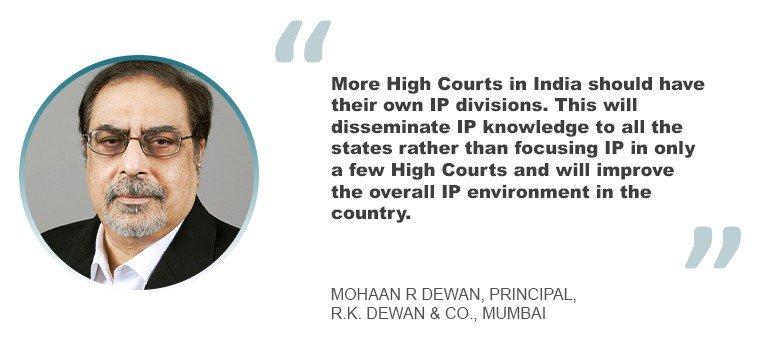
Yes to more High Courts with IP divisions
“In my opinion, more High Courts in India should have their own IP divisions. This will disseminate IP knowledge to all the states rather than focusing IP in only a few High Courts and will improve the overall IP environment in the country,” said Mohaan R Dewan, principal at R.K. Dewan & Co. in Mumbai.
“It is no surprise that the IPD-DHC has been received very well by IP practitioners and owners. Therefore, establishing IPDs in other High Courts is definitely a way forward,” said Yadav. “It will fast-track and streamline IP litigation in India.”
“In my view, more and more High Courts should have specific IP divisions in order to handle and fast-track IP matters. The Delhi High Court’s IP division’s active approach towards effective resolution of IP matters is a very encouraging sign,” Kewalramani said.
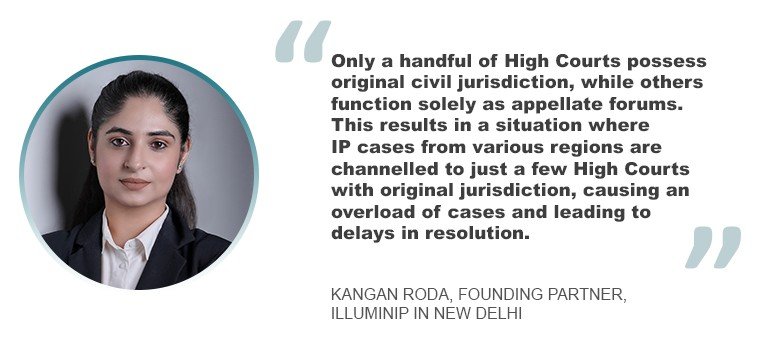
“Certainly, the establishment of dedicated IP divisions in more Indian High Courts is indeed crucial to manage the mounting workload and intricacies of IP cases. This move can streamline proceedings, alleviate the burden on specific High Courts and ensure better accessibility to justice for trademark and IP matters,” added Roda.
IPAB’s dissolution and the subsequent reallocation of its jurisdiction to High Courts presented a challenge, Roda said. “Currently, only a handful of High Courts possess original civil jurisdiction while others function solely as appellate forums. This results in a situation where IP cases from various regions are channelled to just a few High Courts with original jurisdiction, currently only Delhi High Court and Madras High Court, as IP divisions, causing an overload of cases and leading to delays in resolution.”
She cited The Hershey Company v. Dilip Kumar Bacha C.O., which isbeing presided over by the Delhi High Court, as an example. According to Roda, the case drives home the question of jurisdictional scope as far as the Delhi High Court is concerned. The question revolves around a situation where trademark registrations occur in Ahmedabad, but rectification petitions are brought before the Delhi High Court.
“By creating specialized forums for IP matters, High Courts can efficiently address the complexities of this legal domain,” said Roda, “ultimately contributing to the integrity and effectiveness of India's IP landscape.”
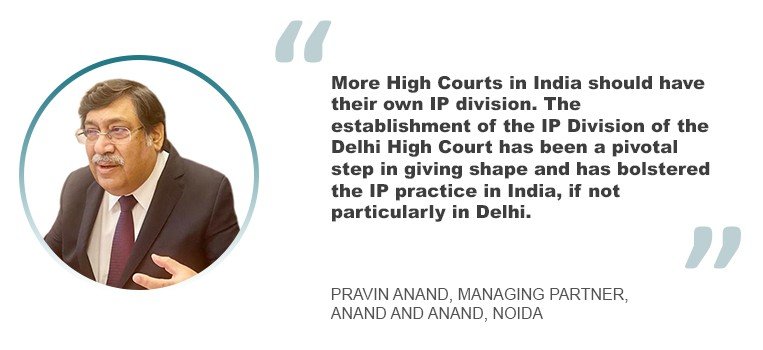
“Yes, more High Courts in India should have their own IP division,” agreed Anand. “The establishment of the IP Division of the Delhi High Court has been a pivotal step in giving shape and has bolstered the IP practice in India, if not particularly in Delhi.”
More specialized IP forums in the offing
So the Delhi High Court took the lead and the Madras High Court followed in its footsteps.
The good news is, other High Courts across India are moving toward a similar direction.
“Definitely, more and more High Courts in the country have either already started the process of creating IP divisions or notifying procedures for IP matters,” said Kewalramani.
In November 2022, the Calcutta High Court notified the nomenclature for IP matters for listing in the cause lists. Others, such as the Gujarat High Court, are assigning IP cases to specific benches on a non-exclusive basis. Judges in different High Courts and district courts are being trained on handling IP matters.
“I am expecting more High courts to establish their own IP divisions and hear IP matters independently,” said Dewan.
“The other High Courts are also likely to follow suit and establish their own IPDs or at least have specific rules or provisions for dealing with IP cases,” said Yadav.
“The Delhi High Court’s successful implementation of an IP division serves as a model for other High Courts to emulate,” Roda added.
Our interviewees have answered the question with a resounding ‘yes.’ They’ve also expressed their belief that more High Courts will go the same path as did the Delhi and Madras High Courts. Developments in India’s IP litigation landscape are definitely exciting to watch.
- Espie Angelica A. de Leon






